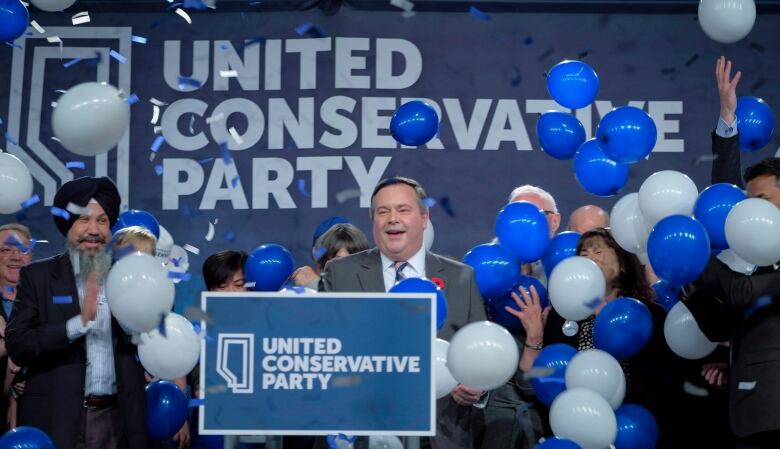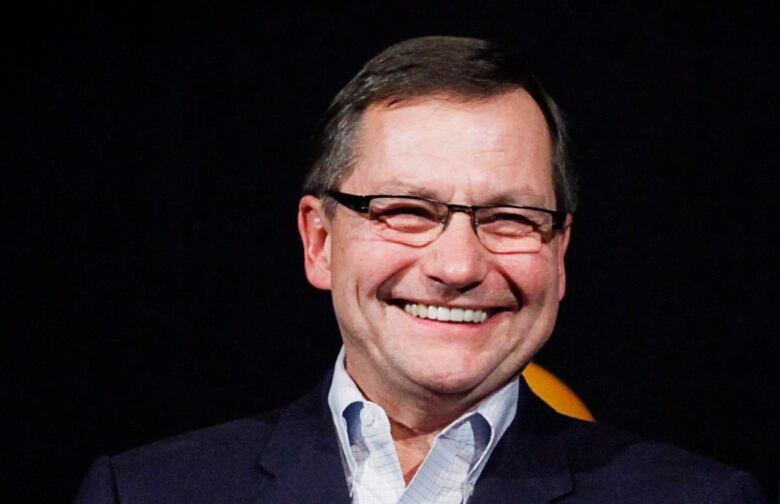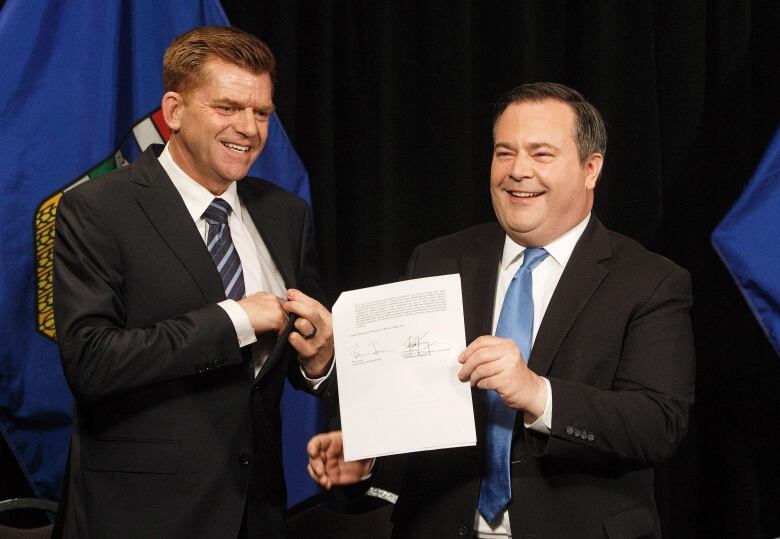Despite divisions and challenges, Alberta's conservative movement remains a powerful force
The UCP may be able to mobilize its members, but the party is a wounded animal, writes Michael Solberg

This column is an opinion by Michael Solberg, a partner and co-owner of New West Public Affairs, a government and public relations firm based in Calgary. For more information about CBC's Opinion section, please see the FAQ.
Apart from the looming 2023 general election, April 9 was supposed to be the most important date in Alberta's upcoming political calendar.
On that day, Premier Jason Kenney was to face an in-person leadership review that had the potential to attract up to 20,000 United Conservative Party (UCP) members to Red Deer.
Had it come to pass, the special general meeting would have marked the most attended political event in the province's history and among the single-most attended in-person voting events anywhere in the country.
Because the minimum cost for attending the event in person was to be $99, if that attendance number held true, the event had the potential to raise north of $2 million for the United Conservative Party in a single-day event.
That number is nearly as much as any Alberta provincial party has raised in a single quarter since 2019, let alone a single-day.
That number is absolutely bonkers.
Malcontent membership
Of course, this enthusiasm from members appeared to be unforeseen.
The logistics, security and safety concerns associated with hosting politically-charged crowds of that size ultimately led to the UCP board of directors voting to move the process to a mail-in ballot.
As a member of the UCP, I believe it was the right move.

Kenney also raised the stakes via comments he made to his party and caucus staff last week.
The comments, which were secretly recorded and leaked to the CBC, included Kenney making the claim that the UCP is a party under siege from "extreme, hateful, intolerant, bigoted and crazy views," that are seeking a hostile takeover of the party.
I will let others debate the merits of this argument – God knows many people are.
But what is clear to me is that the move to a mail-in ballot, which expands the franchise to tens of thousands of additional eligible voters, seems to support Kenney in his effort to stay at the helm to combat groups he sees as such a risk to the party's future.
All of this, of course, is the latest point of malcontent in a membership already divided.
History of mobilization
But it raises the question: Why is the UCP, for all its foibles and controversy over the past few years, still able to generate such passion and enthusiasm from its members in record-breaking numbers?
The answer is simple: it is the healthiest political movement in the country.
Some may dispute this, but the bottom line is this.
If a political movement's health is determined by its ability to mobilize its members, sign-up new ones and earn impactful participation from them in its party processes, then the conservative coalition in Alberta is a juggernaut.
There are many examples that support this.
According to Kenney, at its height in 2018, the UCP had more than 160,000 card-carrying members, making it the largest provincial political party in Canada and one of the largest in the nation, period.
UCP annual general meetings attract thousands of members to convention centres in cities all over Alberta.
Its candidate nomination processes are heated and highly competitive. For decades, a victory in the conservative candidate nomination process put you on the fast track to the Alberta legislature.
This is still true in at least two dozen constituencies around the province.
The historical context
The UCP saw more than 57,000 members cast a ballot in its 2017 leadership race that saw Jason Kenney elected as its party's first permanent leader. By comparison, the 2014 race where Rachel Notley took over leadership of the provincial NDP saw just 3,589 votes cast by its party members.

The PC leadership race in 2011 that made Alison Redford premier of Alberta saw more than 78,000 ballots cast. The PC leadership race in 2006, which elected Ed Stelmach, had an even higher ballot count, with just shy of 100,000 Albertans casting votes in that contest.
Meanwhile, the 2011 Liberal race that saw the election of Official Opposition Leader Raj Sherman, saw just 8,599 votes cast. Today, the provincial Liberals in Alberta are nearly irrelevant, having earned just one per cent of the vote in the 2019 provincial election.
Although tangentially connected, a healthy political party establishment does not necessarily equate to electoral success, or we wouldn't have seen the province elect a majority NDP government in 2015, and Rachel Notley wouldn't be flying high in most horse-race polling today.
But I don't think many would argue against the notion that Alberta's conservative movement is more mobilized and larger than any other in the country, let alone the province.
Western angst since Confederation in 1905 has led to some of the most active political movements in the history of the country.
The Reform Party broke onto the federal stage in 1993 under the mantra "the West wants in" and set the stage for the current Conservative Party we have today.
It was driven by generations of active conservative advocates that also supported a 45-year political dynasty in the provincial Progressive Conservatives.
This same movement saw the rise of parties like the Wildrose, which until 2019 held the distinction of the largest opposition party elected since 1993 in the Alberta legislature.
This deeply rooted and culturally entrenched conservatism also means that the internal party process is often directly linked to government.
The power structure
For generations, electing leaders of conservative parties also meant that this person became premier.
Holding a party membership meant that you got to live in a microcosm that directly elected the person who led the government.
That's power.

The Wildrose-PC party unification process in 2017 was underpinned by Brian Jean and Kenney, who were relentlessly selling thousands of party memberships to endorse unity and to support their eventual leadership bids.
Frequent federal elections of late (Canada has had seven general elections since 2004) have grabbed and held Albertans' gaze on the political process.
Albertans have elected or re-elected a Conservative candidate in 200 of the 214 federal riding contests over that period.
What happens at this leadership review remains to be seen, but one thing is certain: Alberta's conservative movement is a force to be reckoned with and something every other party in this country ought to envy.
But let's be clear, the party at present is a wounded animal.
The caucus is divided. So are its members.
But should this leadership review help them find the resolve to unite behind the common cause to defeat Rachel Notley in 2023, we are headed for the most heated political rematch in the province's history.
Do you have a strong opinion that could add insight, illuminate an issue in the news, or change how people think about an issue? We want to hear from you. Here's how to pitch to us.

